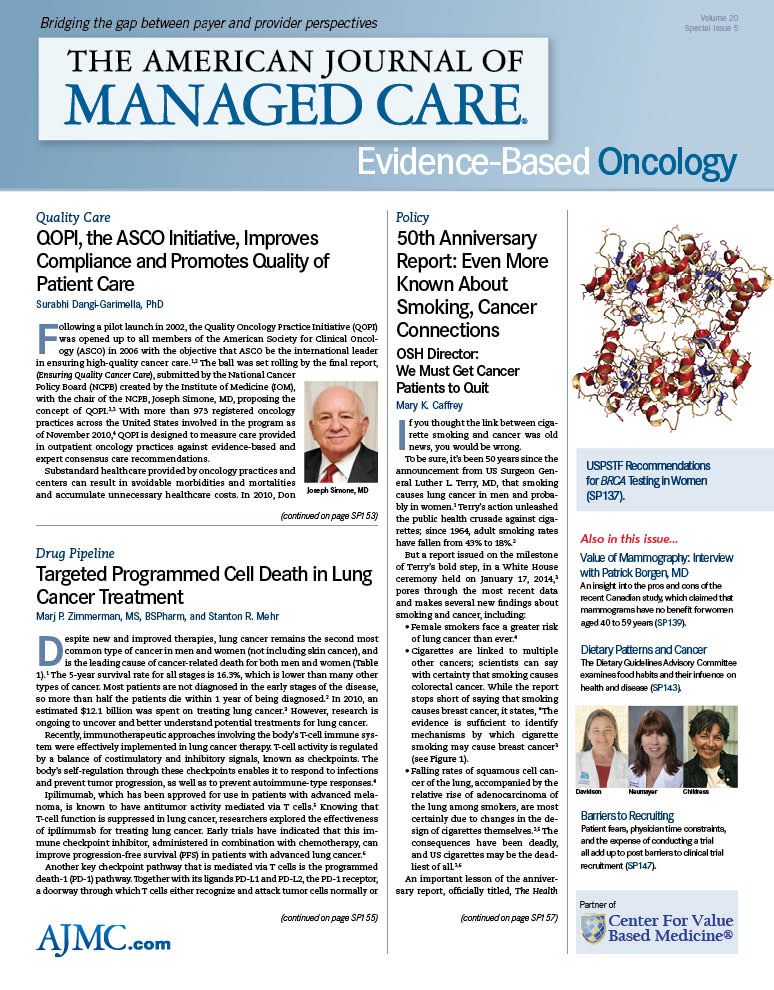- Center on Health Equity & Access
- Clinical
- Health Care Cost
- Health Care Delivery
- Insurance
- Policy
- Technology
- Value-Based Care
Ramucirumab Combination Improves OS and PFS in NSCLC
The second-line administration of ramucirumab in combination with docetaxel has shown a statistically significant improvement in overall survival (OS) and progression-free survival (PFS), compared with placebo plus docetaxel, in patients with non-small cell lung cancer (NSCLC), according to Eli Lilly and Company, the developer of the agent.
The phase 3 REVEL randomized double-blind trial compared ramucirumab and docetaxel with placebo and docetaxel in patients with NSCLC whose disease had progressed after failure of prior platinum-based chemotherapy for locally advanced or metastatic disease. More than 1200 patients, with both squamous and nonsquamous NSCLC, were enrolled across 26 countries.
“We are pleased with these phase 3 data of ramucirumab in non-small cell lung cancer, which accounts for most cases of lung cancer—the leading cause of cancer-related mortality worldwide. Despite currently available therapies, there continues to be a need for new second-line treatment options for patients with lung cancer,” Richard Gaynor, MD, senior vice president, product development and medical affairs for Lilly Oncology said in a press release.
“REVEL is the first positive phase 3 study of a biologic in combination with chemotherapy to demonstrate improved overall survival compared to chemotherapy alone in second-line non-small cell lung cancer.”
The most common (>5% incidence) grade >3 adverse events occurring at a higher rate on the ramucirumab plus docetaxel arm compared with the control arm were decreased white blood cell count (neutropenia/leukopenia), febrile neutropenia, fatigue/asthenia, and hypertension.
Full data from the REVEL trial will be announced at an upcoming scientific meeting and Lilly said it intends to submit the first application of these data to regulatory authorities this year. Ramucirumab, a fully human monoclonal antibody, targets vascular endothelial growth factor receptor-2. It is designed to directly inhibit angiogenesis, a process by which blood vessels
supply blood to tumors.
In an open-label phase 2 study of 140 chemotherapy-naive patients, ramucirumab was investigated in combination with first-line chemotherapy in advanced nonsquamous NSCLC. For patients who received pemetrexed (500 mg/m2) plus carboplatin (AUC = 6) or cisplatin (75 mg/m2) once every 3 weeks, the median PFS was 4.3 months. In patients who received ramucirumab (10 mg/kg), pemetrexed (500 mg/m2) plus carboplatin (AUC = 6) or cisplatin (75 mg/m2) once every 3 weeks, the median PFS was improved to 6.3 months (hazard ratio = 0.48; 90% confidence interval [CI]; 0.31-0.74).
Ramucirumab was also studied in combination with paclitaxel and carboplatin as first-line therapy in patients with advanced NSCLC. Forty patients received ramucirumab (10 mg/kg), paclitaxel (200mg/m2), and carboplatin (AUC = 6) on day 1 of a 3-week cycle for up to 6 cycles, followed by maintenance ramucirumab.
The overall disease control rate (complete response + partial response + stable disease) reached 90% and PFS at 6 months was 59.0% (95% CI; 41.3-72.9). In this analysis, the median PFS was 7.85 months.
The REVEL lung cancer trial is the third positive phase 3 study of ramucirumab across multiple tumor types. The first, which studied ramucirumab in gastric cancer as a single agent, is the basis for initial regulatory submissions in the United States and Europe. The second study evaluated ramucirumab in gastric cancer in combination with paclitaxel and is scheduled for regulatory submission in 2014.
Top-line results for phase 3 trials of ramucirumab in hepatocellular and colorectal cancer are expected later this year.

Building Trust: Public Priorities for Health Care AI Labeling
January 27th 2026A Michigan-based deliberative study found strong public support for patient-informed artificial intelligence (AI) labeling in health care, emphasizing transparency, privacy, equity, and safety to build trust.
Read More
Ambient AI Tool Adoption in US Hospitals and Associated Factors
January 27th 2026Nearly two-thirds of hospitals using Epic have adopted ambient artificial intelligence (AI), with higher uptake among larger, not-for-profit hospitals and those with higher workload and stronger financial performance.
Read More
Motivating and Enabling Factors Supporting Targeted Improvements to Hospital-SNF Transitions
January 26th 2026Skilled nursing facilities (SNFs) with a high volume of referred patients with Alzheimer disease and related dementias may work harder to manage care transitions with less availability of resources that enable high-quality handoffs.
Read More
Specialty and Operator Status Influence Electronic Health Record Use Variation
January 22nd 2026Operators demonstrated specialty-specific differences in electronic health record efficiency, timeliness, and after-hours use, highlighting how workflow and training shape documentation behaviors across medical disciplines.
Read More

